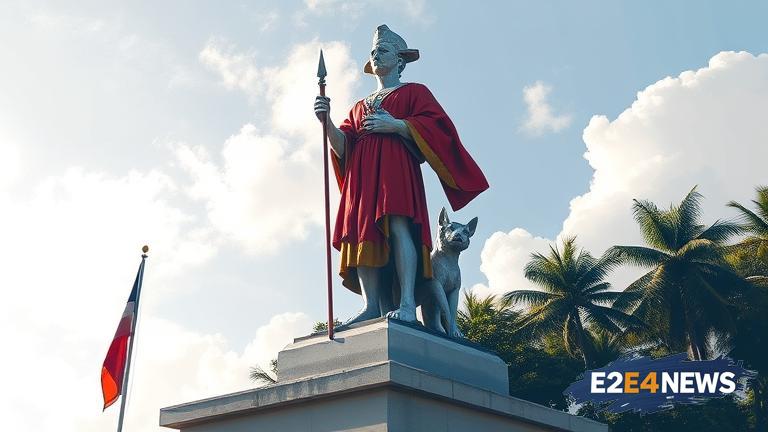The recent removal of the Christopher Columbus statue in Trinidad and Tobago has sparked a mix of emotions, with some hailing it as a victory for the island’s indigenous people and others lamenting the loss of a historical landmark. The Cross Rhodes and the Emancipation Support Committee of Trinidad and Tobago (ESC/TT) have expressed their gratitude for the removal, citing the statue’s association with colonialism and the erasure of the island’s indigenous heritage. The statue, which stood in the capital city of Port of Spain, was a source of controversy for many years, with many arguing that it represented a painful reminder of the island’s history of colonization and exploitation. The removal of the statue is seen as a significant step towards reconciliation and recognition of the island’s complex history, and is part of a broader movement to reexamine and redefine the island’s cultural identity. The ESC/TT has long advocated for the removal of the statue, arguing that it perpetuated a false narrative of the island’s history and ignored the experiences of the indigenous people. The committee has also called for a more nuanced and inclusive approach to the island’s history, one that acknowledges the contributions and struggles of all communities. The removal of the statue has been met with widespread support from the public, with many taking to social media to express their gratitude and relief. However, not everyone is pleased with the decision, with some arguing that the statue was an important part of the island’s cultural heritage. The debate surrounding the statue’s removal has sparked a wider conversation about the island’s history and identity, with many calling for a more critical examination of the island’s past and its ongoing impact on contemporary society. The ESC/TT has emphasized the importance of education and awareness in promoting a more nuanced understanding of the island’s history, and has called for the development of educational programs and cultural initiatives that reflect the island’s diverse heritage. The removal of the statue is also seen as an opportunity to promote a more inclusive and equitable society, one that values and respects the contributions of all communities. The government of Trinidad and Tobago has been praised for its decision to remove the statue, with many seeing it as a significant step towards reconciliation and healing. The ESC/TT has also commended the government for its commitment to promoting a more nuanced understanding of the island’s history, and has called for continued support and resources to be dedicated to this effort. The removal of the statue has also sparked a wider conversation about the role of monuments and public art in shaping our understanding of history and identity. Many have argued that monuments and public art should reflect the values and principles of a society, and should be used to promote education, awareness, and social justice. The ESC/TT has emphasized the importance of community engagement and participation in the development of public art and monuments, and has called for a more inclusive and collaborative approach to the creation of public spaces. The removal of the Columbus statue in Trinidad and Tobago is a significant step towards reconciliation and recognition of the island’s complex history, and marks an important milestone in the ongoing struggle for social justice and equality. As the island continues to grapple with its past and its ongoing impact on contemporary society, the removal of the statue serves as a powerful reminder of the importance of education, awareness, and community engagement in promoting a more nuanced and inclusive understanding of history and identity. The ESC/TT has pledged to continue its work in promoting a more nuanced understanding of the island’s history, and has called for continued support and resources to be dedicated to this effort. The removal of the statue is a testament to the power of community activism and advocacy, and serves as a reminder that collective action can lead to significant positive change. The ESC/TT has emphasized the importance of ongoing education and awareness in promoting a more nuanced understanding of the island’s history, and has called for the development of educational programs and cultural initiatives that reflect the island’s diverse heritage. The removal of the statue has sparked a wider conversation about the island’s history and identity, and has marked an important milestone in the ongoing struggle for social justice and equality.
